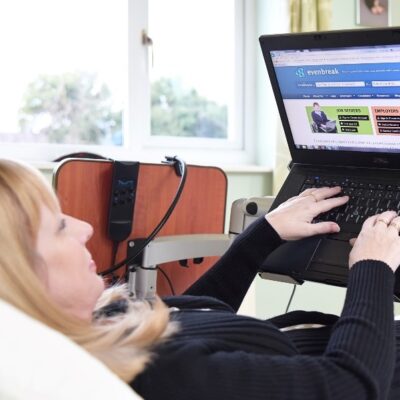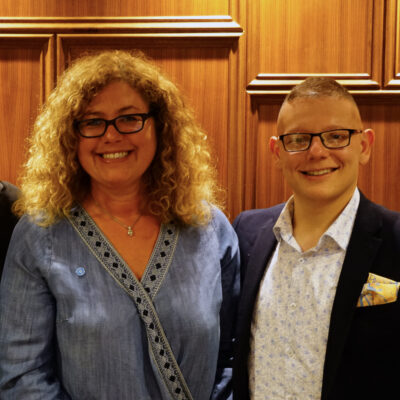How did you become successful?
For me, having a positive impact on the world has been a driving force from the beginning.
I studied economics at university and the typical gravy train would have been going into banking, but that didn’t interest me.
So initially I started in management consultancy and then, before starting my own business, I worked for five other startups to understand how they were disrupting business models in different industries, to build up the skill sets required to basically go it alone and build my own thing, which was Metail.
Our impact should be to massively reduce the amount of wastage in the clothing industry, which is still an ultimate goal of mine.
The apparel industry is responsible for 10% of all global carbon emissions and 35% to 40% of clothes are never sold. So there’s massive overproduction and that’s through a complete inability of matching both production quantities, and garments to end users.
My ambition, right from the early days, was effectively to be as big as Facebook, to be a global independent business from day one. So from that perspective, I would say that I failed in my mission.
What is your greatest achievement in business?
It’s always been related to people. The ability to accumulate a fantastic group of supremely talented individuals way more knowledgeable than I am, and experts in their fields, is something that is really humbling.
As the son of two immigrant parents – one from Norway and one from Nigeria – I felt I had no network in the UK.
So the idea of network felt like a dirty word to me. It felt unfair that other people could call on Uncle Jack or a parent’s friend to connect them into potential work experience opportunities.
But over time I realised that actually network is what you make of it. It’s your responsibility over the course of your career.
It’s all about developing your own reputation, it’s all about trying to help other people first before they help you. And over the course of time you end up building an incredible network of people who are all looking to positively connect you to people who can help you on your mission.
What is the one essential business lesson every entrepreneur should know?
It’s okay to ask for help and you should ask for help. Don’t try to reinvent the wheel but find someone else who has done it before.
Also, it’s a hugely lonely world being an entrepreneur and all of the best stories have sadness and difficulty behind them. Look after your own mental health by seeking and generating a good support network around you.
Not only people who can give you support and you feel it’s okay to be vulnerable with, but also surround yourself with people who can help you with questions that you might not know the answer to.
You don’t have to be a hero all the time and it’s good to be upfront about the unknowns and find people to help you with those.
Tell us about your work/life balance.
I stole this from Brad Feld who doesn’t like the word balance. He talks about harmony.
As an entrepreneur. I have an addiction to stimulus, to making stuff happen and go, go, go. So balance implies you go down with one and you go up to the other until it’s all equal, which isn’t quite right. You want to be happy at work and happy in the rest of your life and and make the two things work together.
Certainly, I had loads of tough times with Metail. I always thought about stress as a mental thing, but it ends up translating into the physical. I have had a blister on my left retina for years which is a byproduct of too much adrenalin, too much cortisol.
The thing that I’ve learned in building a business is that the better the team around you, the better you can hand off and delegate responsibility and you start to work in a slightly different way.
When you’re younger, you’re at the company all hours, the social environment is very important, you’re spending time bonding with your colleagues, outside work as well as in work.
And then you start to get a family and you want to be home for bedtime, but you’re still working evenings. That’s when work and hobbies and life blend into one and harmonise – when you’re doing the thing that you love and you manage to make a life fit around it.
For me, I have work, I have family and then myself … and I come last. The language I would have for any future startup is making sure I find a way to make me come higher in the mix.
Why did you want to get involved with the Expert Impact?
I like the idea. It was this notion of giving people access to others they otherwise wouldn’t be able to reach.
I have the luxury of feeling like I’m one or two steps removed from everyone I’d want to get to. But most people aren’t. So in this scenario it felt like a really good scheme.
You can just sign up and get access to these great people that might be able to answer that one question or give you a jump into a different universe that can really transform your business. It seemed like a no-brainer to me.
Also: founders are interesting. They’ve got passion and energy that you don’t get in most ordinary life. So why wouldn’t you want to work with some interesting founders working on some interesting challenges?
Which social causes are you passionate about?
Equal opportunity and ensuring that everybody has or can aspire to the same goals and objectives as anyone else.
And then the other side is making sure we’ve still got a planet that’s still going to be around for my kids and my grandkids.
Like to meet Tom for some mentoring? Apply here.



